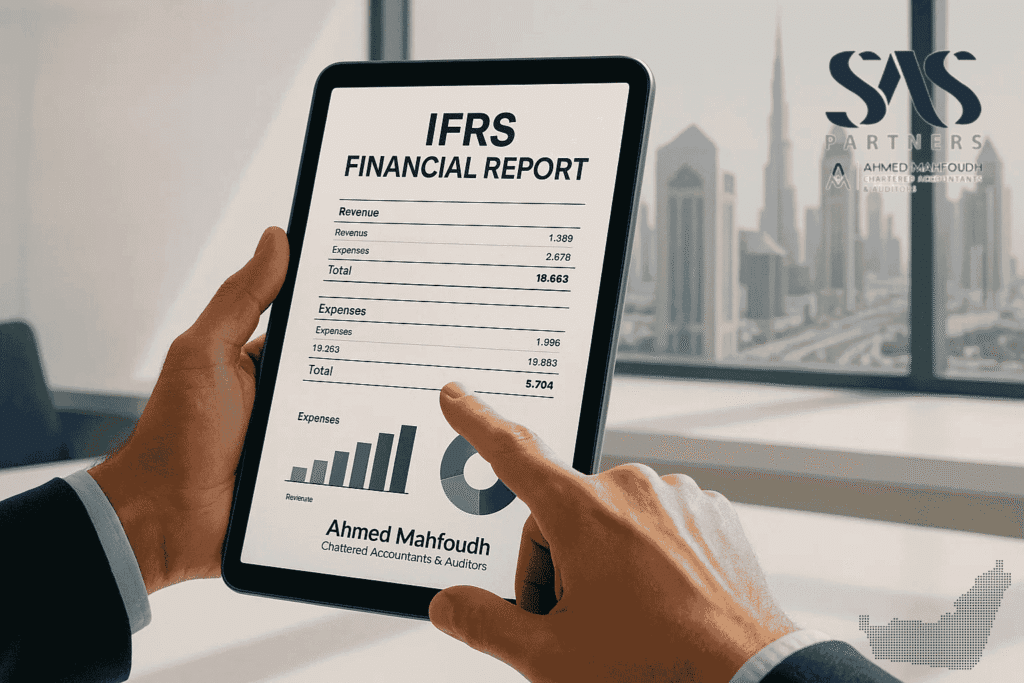
International Financial Reporting Standards or IFRS, A global accepted set of accounting standards employed to present financial statements in a common language. They render financial statements transparent, comparable, and credible worldwide. The application of IFRS will assist UAE businesses in developing investor confidence, ease cross-border transactions, and be consistent with the UAE’s emerging corporate tax and financial laws.
UAE international financial accounting standards: What Every Business Owner Needs to Know
To initiate and run a business in the UAE nowadays requires more than a great idea. With an economy as vibrant and globally connected as that of the UAE, being aware of your financial reporting needs is more than a regulatory imperative—it’s a strategic imperative. You are a small firm or a global organization, with knowledge of international financial accounting standards, you will be the passport to credibility, investment, and long-term growth in this globalized environment.
The UAE Mandate on international financial accounting standards
The UAE has taken the strategic decision to converge its financial landscape to best global practices. A series of legislation and regulations, led by the UAE Commercial Companies Law of 2015, makes this possible by mandating that each company prepare financial statements using international financial accounting standards. The UAE’s introduction of Corporate Tax in 2023 further emphasized this requirement, as businesses must calculate taxable income from financial statements that companies prepared in line with these standards.
This move brings several major benefits to the UAE business community:
- Stronger International Credibility: Adoption of IFRS makes your financial statements immediately understandable and trustworthy for investors, lenders, and global partners. This is especially significant for UAE, KSA, Qatar, UK, and USA companies who are involved in foreign trade or seek foreign investments.
- Improved Comparability: IFRS allows for “apples-to-apples” financial performance comparability between companies regardless of location. This simplifies due diligence for investors and allows for companies to compare themselves with international players.
- Tax Compliance Link: The UAE Federal Tax Authority (FTA) requires financial statements under IFRS for proper calculation of corporate tax, creating an immediate link between international financial accounting standards compliance and tax compliance.
IFRS for SMEs: A Competency-Driven Approach
To small and medium-sized enterprise businesses (SMEs) and startups, the prospect of embracing complete international financial accounting standards seems intimidating. Realizing this challenge, the International Accounting Standards Board (IASB) issued the IFRS for SMEs Accounting Standard. It is a simplified, stand-alone form of the full IFRS, with the goal of reducing complexity and cost without compromising either the quality or the reliability of financial reporting.
Key Benefits of IFRS for SMEs
- Lower Complexity: The IFRS for SMEs standard is a reduced form of the full IFRS. It excludes complex subjects and complex disclosures that are not relevant to smaller, non-publicly accountable entities.
- Cost-Effective: By simplifying the requirements, the standard reduces the cost to SMEs, both financial and administrative, allowing them to focus resources on innovation and growth.
- Global Credibility: Implementing international financial accounting standards for SMEs gives your business instant credibility with suppliers, lenders, and potential partners locally and globally. It speaks to transparency and professionalism.
Theory into Practice: Implementing IFRS
Implementing international financial accounting standards must be a systematic process. It is more than a one-time adjustment; it’s a change in the way you handle your financial data.
- Assess Your Existing Role: Start with a gap analysis. Cross-reference your current accounting procedures with IFRS standards to identify what needs changing.
- Train Your Employees: Ensure your accounting staff and management understand the new standards. Financial reporting training, accounting principles training, and bookkeeping training under IFRS are necessary.
- Update Your Systems: Your internal systems and accounting software must be capable of generating IFRS-compliant reports. That might require an upgrade or some advice from a tax advisor equipped with the proper tools.
- Bring in Experts: IFRS is highly complicated. The best way to ensure a smooth conversion and ongoing compliance is to have a professional firm with a history of audit and assurance and financial advisory services.
At SAS PARTNERS, we have professionals to help your business in the UAE navigate each phase of this process. We specialize in taking detailed requirements and turning them into sleek, streamlined solutions whether you’re a new business needing an easy accounting installation or a large multi-national with complex financial products. We ensure not only that your financial statements are compliant, but that they are useful tools for making decisions.

The Cost of Non-Compliance
Disregarding the requirement for the implementation of international financial accounting standards can cost your company more than the actual implementation.
- Regulatory Penalties: The FTA and the regulatory authorities in the UAE charge hefty fines for improper or non-compliant financial reporting.
- Failed Audits: Your annual audit may fail, resulting in delayed renewals of your license and loss of reputation.
- Limited Growth: Banks will reject loan requests, and investors won’t be willing to fund a business that doesn’t have credible, transparent financial reports. This directly limits your ability to grow and expand.
- Lack of Trust: Non-compliance erodes trust with stakeholders like customers, suppliers, and partners.
FAQs on International Financial Accounting Standards in the UAE
Q1: Is IFRS for SMEs a regulatory requirement in the UAE?
While all UAE firms are mandated to employ international financial accounting standards, the IFRS for SMEs standard is a simpler variant that is expressly permitted to be applied by non-publicly accountable SMEs. The UAE Commercial Companies Law allows it for smaller firms.
Q2: What is the biggest difference between IFRS and GAAP?
IFRS is a principles-based standard that focuses on the underlying principles of financial reporting. In contrast, the US Generally Accepted Accounting Principles (GAAP) is rules-based and contains more explicit and stringent rules. The UAE primarily follows IFRS.
Q3: In what way does international financial accounting standards affect Corporate Tax calculations?
The UAE Corporate Tax Law requires businesses to compute their tax base from financial statements that companies prepare in accordance with international financial accounting standards. This requires compliance with IFRS in tax calculation and reporting properly.
Q4: Is it possible for a small business to operate on a cash basis accounting?
According to the PwC Guide to Accounting Standards, entities with revenue no more than AED 3 million may be permitted to report financial statements on cash basis of accounting. Full IFRS or IFRS for SMEs could be mandated for larger entities, however.
Q5: What is the benefit of IFRS for global companies?
Using international financial accounting standards makes it easier for international companies to consolidate financial reports across borders. Cross-border operations become easier, and reporting by multinational businesses is made simpler.
Q6: How can SAS PARTNERS help my business become international financial accounting standards compliant?
Our staff at SAS PARTNERS provides comprehensive accounting and audit services, including IFRS implementation, preparation of financial statements, and regular advisory to make sure that your company is completely compliant with all UAE laws.
Your Partner in Financial Excellence
A reliable guide helps you navigate the nuances of international financial accounting standards in the UAE. Ahmed Mahfoudh Chartered Accountant & Auditor (SAS PARTNERS ) brings its global expertise and local experience to help your business achieve financial transparency and sustainable growth. For us, compliance is not only essential but also an opportunity doorway.
Let us craft your prosperity story together. Contact us today to arrange your free consultation and get your business compliant and future-proofed.